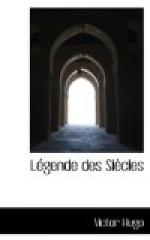La ronce, le serpent, tord sur lui ses anneaux. (Eviradnus, 1. 98.)
On voyait sur ses ponts des rouleaux
de cordages
Monstrueux, qui semblaient des boas endormis.
(Pleine Mer, ll. 125-6.)
Ce sinistre vaisseau les aidait dans
leur oeuvre.
Lourd comme le dragon, prompt comme la couleuvre.
(Ibid. 11. 116-17.)
L’ail voyait sur la plage amie
Briller ses eaux,
Comme une couleuvre endormie
Dans les roseaux.
(Derniere gerbe.)
Par instants, dans cette profondeur vertigineuse, une lueur
apparaissait et serpentait vaguement, l’eau ayant cette puissance,
dans la nuit la plus complete, de prendre la lumiere
on ne sait ou et de la changer en couleuvre.
(Les Miserables.)
La, c’est le regiment, ce serpent
de batailles
Trainant sur mille pieds ses luisantes
ecailles.
(Les
Voix Interieures.)
J’ai vu au loin comme un long serpent
de brume avec des
ecailles de soleil ca et la pose sur l’horizon...
C’etait l’Angleterre.—
France
et Belgique.
Dans ses flancs tenebreux, nuit et jour,
en rampant
Elle (la terre) sent se plonger
la racine, serpent
Qui s’abreuve aux ruisseaux des
seves toujours pretes.
(Souvenirs
d’Enfance.)
cape, a cloak with hood, with which women protect their head and shoulders. Used in Modern French only in a few provinces, except in certain phrases such as sous cape, ‘secretly’. The word is the same as the English ‘cape’.
C’est la marine! Marine is often used as a nickname, as we say in English ‘Jack’. On the French coast the word is often familiarly used in speaking to a man who is or has been a sailor, e.g. Dis-donc, la marine! Tiens, voila la marine! In this case it means ‘Here am I!’
bonnet de forcat, ’woollen cap worn by convicts and also by fishermen.’
chiffon: used colloquially for a child, especially for a little girl.
PLEINE MER. (PAGE 118.)
Analysis. The vision of a gigantic derelict vessel on a boundless sea. This is the old world, the past of grandeur and horror.
In the nineteenth century a monster warship was built on the Thames, type of the spirit of that age. It carried two thousand guns; its topmast was higher than St. Paul’s; now it has become this derelict.
The old world was subject to many plagues and scourges. Its moving spirit was Hatred, its characteristic, Division. Race strove with race; vice, ignorance, superstition, cruelty prevailed.
Now the old world has vanished, the ship is deserted. What has become of man? Look upwards!




